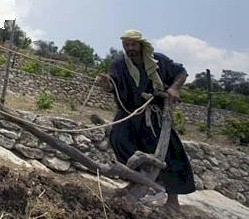13th Sunday in Ordinary Time - Hands to the Plow
As adults, we can claim to have seen a lot in our lives. We are experienced in some of the rough parts of life. We have had promises broken, been betrayed and have had our share of disillusionment. Our instinct for survival fights fiercely against any threat to our identity and our existence. We can easily become frustrated, cynical and totally self-absorbed. Yet there is a trusting child within each of us - one who is willing to put his/her life into the hands of the one who walked the road to Jerusalem, to trust him and to follow wherever he would lead.
 The call to discipleship comes in the ordinariness of our lives along the road. Like Elisha it comes while we are "plowing" - busy about our day's work: teaching a class, waiting on tables, straightening our desk, turning on the computer, answering the phone, sitting at the reception desk, tending to our children. In one way or another the invitation to "Follow Him" comes every day. It is very present-tense and it suggests that we pause, stop to listen for a moment and wonder how we can respond.
The call to discipleship comes in the ordinariness of our lives along the road. Like Elisha it comes while we are "plowing" - busy about our day's work: teaching a class, waiting on tables, straightening our desk, turning on the computer, answering the phone, sitting at the reception desk, tending to our children. In one way or another the invitation to "Follow Him" comes every day. It is very present-tense and it suggests that we pause, stop to listen for a moment and wonder how we can respond.
The call to discipleship is immediate. There is no turning back. On the face of it, this idea sounds unnatural, almost suicidal. But as we watch Jesus live it out in His own choices and actions, we begin to understand. He put His will, His gifts, His very life at the service of His Father. He trusted the love and providence of His Father. Step by step, He began to experience how His Father's love turned evil into good, and dying into living. Every time He chose the Father's will instead of His own, He was freer, richer, more complete as a man. Every time He put aside His own desires to serve others, He became more fully alive, more fully a part of everyone else.
It is this kind of unselfish love that propels people into lives of service and ministry, into marriage and family, into priesthood and religious life. It is this kind of commitment to the Lord that is put to the test by the trials of life - sickness, failure, natural disasters, the death of our loved ones. We get to understand what "dying to self" means when our patience is tried to the breaking point by a rebellious teenager, or an irresponsible spouse, or the death of a loved one. We are asked to give up our own lives in favor of a parent suffering with alzheimers, or a victim of AIDS, or someone close to us who is being destroyed by drugs or alcohol.
The disciple is not surprised, or angered, or lost in despair when this happens. To walk in the footsteps of the Master means to put aside self, willingly, generously, and with absolute trust. It means giving without measuring the cost. It means putting our hands to the plow and not looking back.
This is not a part-time job. It is not something we do only on Sunday at church and occasionally doing a few good deeds during the week. Taking up the cross isn't a part-time practice we do on Good Friday, or when we are feeling strong and resilient. Nor is sacrifice in Jesus' name something reserved for some specially selected martyrs whose names are inscribed on Christian monuments. Instead, Jesus says losing our lives for his sake must be daily. It's not a part-time religion - it's a full-time following! Taking up the cross is part and parcel of the lives of all who follow him.
St. Paul tells us: "For freedom, Christ has set us free." Freedom from death and sin. Freedom to Love. Freedom to live. What we know to be absolutely true is that our response to Jesus' invitation involves us for the long haul and it will require sacrifice. We also know that his call and our faithfulness to it is totally liberating. It gives us vision, focuses our energies and opens us to give ourselves generously and freely to the kingdom which Christ came to proclaim.